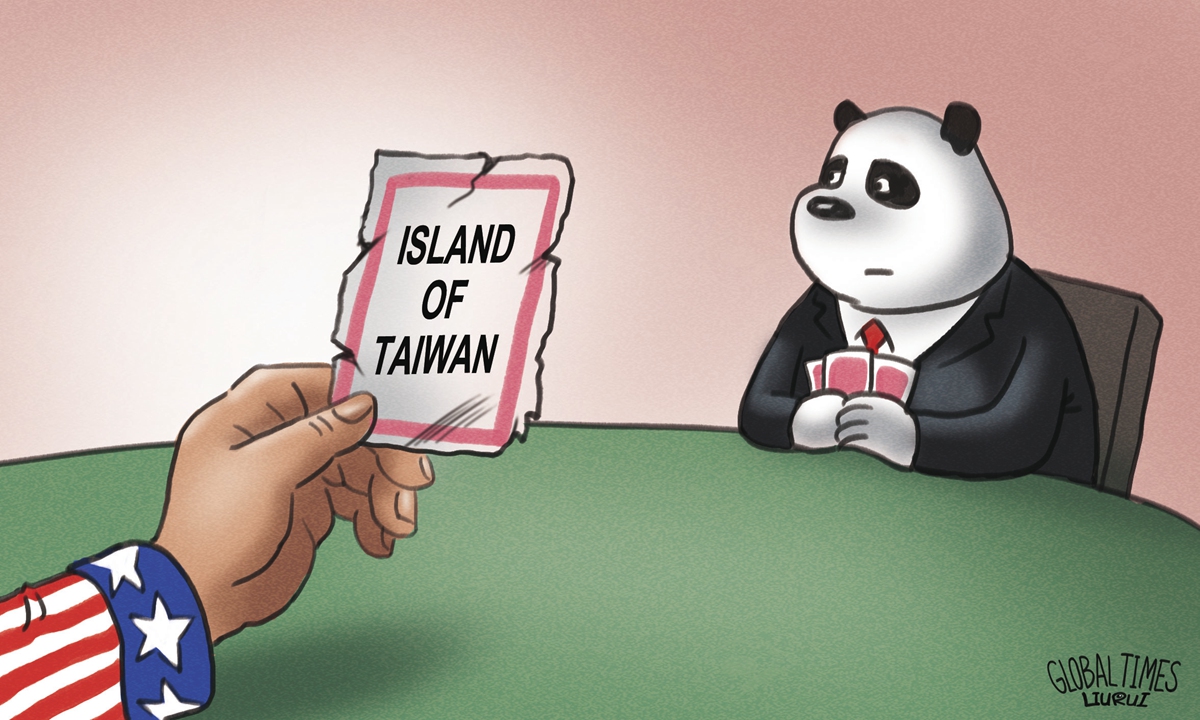
US, China, Taiwan island Illustration: Liu Rui/GT
US media recently reported that the Chinese military has built targets "in the shape of an American aircraft carrier and other US warships in the Taklamakan desert" to conduct targeted military exercises. According to the Wall Street Journal on Monday, this shows "how the People's Libration Army is focused on increasingly realistic training as tensions with the US rises" over the island of Taiwan.Even if the report is true, this is normal to the Chinese people.
Reunification has been one of the most important national goals of the People's Republic of China since its establishment in 1949. Reunification by force has always been one of the options.
China is also well prepared for what kind of military support the US will give to Taiwan secessionists. China will never give up the option of reunification by force just because the US will assist in the defense of Taiwan.
The discussion about reunification by force or by peace should depend on the current situation.
The current problem is this: Although the US government has not formally announced that it will defend Taiwan once a war breaks out, its strategic ambiguity it has always claimed is gradually weakening and the "clarity" is obviously increasing. Besides, elements in the US that are hostile toward China are constantly and deliberately creating hostility between the mainland and the island of Taiwan. Washington has also roped in its allies to show off their might in the periphery of China.
During an interview with CNN in October, US President Joe Biden said that the US would "defend Taiwan" if the Chinese mainland attacked. The White House quickly retracted such statements, saying that Biden was not suggesting a policy change. But to some extent, Biden's words were still a message to Taiwan.
With Washington's support, Taiwan authorities are approaching their goal of Taiwan secession. Hopes for peaceful reunification are dwindling. Under such circumstances, the problem for the mainland is no longer about choosing between military actions or peaceful solutions. What it can do is to prepare for reunification by force.
When China and the US negotiated the joint communiqué on the establishment of diplomatic relations in 1978, the core issue was US arms sales to Taiwan. In January the following year, China and the US established diplomatic relations, and the US enacted the Taiwan Relations Act. Although the law does not explicitly say that once Taiwan becomes independent and China resorts to force to seek reunification, the US would provide Taiwan with military support and intervene in the situation, it allows for arms sales to Taiwan and raise Taiwan's ability for defence. This ties Taiwan to the US strategy.
Several generations of Chinese leaders have been well aware of this. Since the reunification by force is an option on the table from the beginning, China has always considered how to deal with US military intervention.
The recent hyping of the Taiwan question by the US is related to its strategic shift toward China.
To put it more bluntly, when it comes to what China wants and why the country needs it, the US has always viewed it from the perspective of maintaining its hegemonic dominance. It is impossible for Washington to understand that the rise of an oriental power like China is totally different from the rise of a Western power.
The goal of national reunification pursued by China is inevitable if we view throughout history. It is one vital part of China's national rejuvenation.
For successive leaders of China, the reunification of the motherland is not a matter of whether it can be achieved or not. Instead, it is a matter of how to achieve this as soon as possible. Reunification is both an unshakable goal and a bottom line. There will never be a retreat.
While the US sees Taiwan as an important pawn in its efforts to maintain the security order in the Asia-Pacific, China's reunification will inevitably break the existing framework of regional strategic balance and shake the US position in the region.
This is a structural contradiction, and if the US is to desperately seal off the basic requirements for China's rise, then the US is doomed to drag itself into an unprecedented abyss of danger.
(Ding Gang, a senior editor with People's Daily, and currently a senior fellow with the Chongyang Institute for Financial Studies at Renmin University of China.The views don't necessarily represent those of this platform.)






